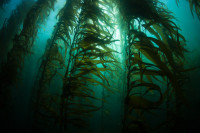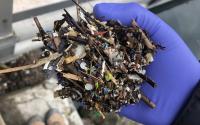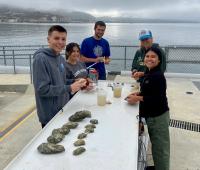Breadcrumb
News archives
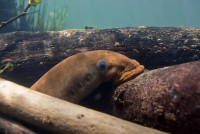
Endangered ecosystem guardians: Two potential new lamprey species discovered
Reviled as bloodsuckers and diminished in numbers, lampreys cultivate river ecosystems

It’s easy to spot a fish — but not so easy to track its spawning
Research supported by California Sea Grant and the Ocean Protection Council homes in on spawning behaviors
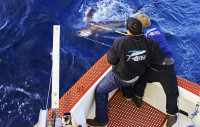
Rewriting Pacific swordfish boundaries
A new, comprehensive dataset clarifies where swordfish travel — which has reworked international management plans

Press Release: New paper shows that adding even small amounts of water to streams can help California’s migratory fish
Researchers from UC Berkeley and California Sea Grant say the technique offers a simple tool to help assist California’s migratory fish
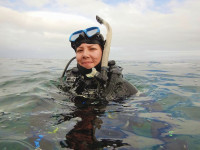
Bridging Borders for Coastal Resilience
California Sea Grant’s First-Ever Binational Climate Fellow Meliza Le Alvarado forges coastal collaborations
How A California Sea Grant Program Helped Shed Light on Salmon Recovery
California Sea Grant completes nearly two decades of monitoring and research.
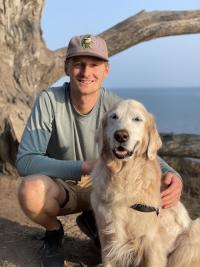
From finance to shaping a sustainable future
California Sea Grant State Fellow Michael Wells looked at lithium extraction to help California reach its targets for clean air and climate change

Cutting-Edge Science for Kelp Restoration
Results from six innovative research projects will help protect and restore California's vital kelp forests

Searching for California condors’ new home
A pair of California researchers combine novel techniques to offer iconic birds a new hope
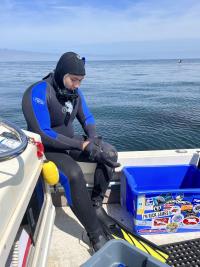
Ready for the Next Step: Underrepresented & Minority Undergrads Wrap Up Their California Sea Grant Internships
The year-long internships focus on kelp recovery, but the opportunity allows students to gain new experiences in science. For some, it’s helping to launch new careers.
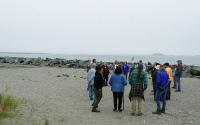
Spent nuclear fuel sits on a crumbling California coastline. So what to do?
A Cal Poly Humboldt research team considers varied viewpoints on a tangled problem
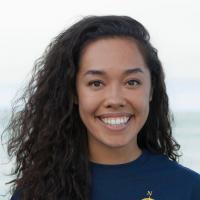
Knauss fellow Carina Fish melds justice and science
Working in a senate office reveals ‘how the cookie is made’
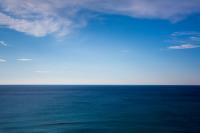
Forging community and joint voices in the face of DDT’s environmental threat
When offshore DDT disposal in California resurfaced in the media, two Sea Grant programs joined forces
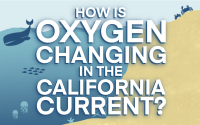
The story in the data
Marine science interns turn to storytelling to clarify the numbers behind hypoxia in California
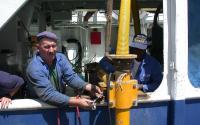
The unassuming device that maps California’s fish eggs
California Sea Grant funding helped an innovative tool spread across the world

A $2.7 Million Funding Award Aims For End-of-Life Solutions For Plastics Used By Growers Along California’s Central Coast
Millions of pounds of plastics are used on coastal farm fields each year; a new funding award will help researchers to find ways of keeping it out of nearby streams and the ocean
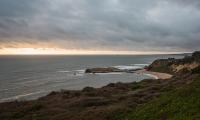
California Sea Grant’s Role in Creating the MPA Network
The state’s unique network of marine protected areas extends for over a thousand miles and protects California’s coastal and marine ecosystems holistically
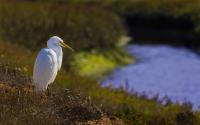
Symposium connects science and management in Southern California’s wetlands
The San Diego Estuaries Research Symposium offered a look at innovative wetland research
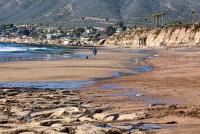
Researchers are studying how oyster reefs and eelgrass can fight coastal erosion in California
Living shorelines can help combat erosion caused by sea level rise. A new study investigates what approaches work best.
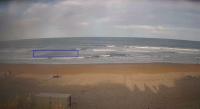
Researchers awarded $150,000 to develop RipFinder app
A new funding award will help warn ocean swimmers of dangerous rip currents before they enter the water
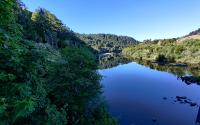
Droughts are Shifting Migration Patterns in Already Endangered Russian River Coho Salmon
Lower flows and warming water temperatures are creating a potentially deadly timing mismatch for young salmon headed to sea
